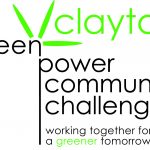ROG has a new set of wheels, thanks to Laclede Gas!
In 2011, Recycling On the Go (ROG) will have even more “Go” with our new 2005 Chevrolet 2500HD Bi-Fuel Natural Gas pick-up truck! Once a vehicle in the Laclede Gas fleet, it will now be seen zipping from event to event during the ROG season, helping us make celebrations in the St. Louis area more sustainable.
As a fuel, natural gas is non-toxic, non-corrosive and non-carcinogenic, presenting no threat to soil or ground water. The emissions are also significantly cleaner than gasoline or diesel—producing significantly lower amounts of nitrogen oxides, particulate matter, and carbon dioxide. Since it is extracted domestically, using natural gas can be beneficial to the American economy.
On average, Natural Gas Vehicles (NGVs) reduce toxic emissions by over 90% compared to their gasoline or diesel counterparts and reduce greenhouse gas emissions by roughly 25% (Alternative Fuels & Advanced Vehicles Data Center, U.S. Department of Energy[1]). A NGV makes sense for our non-profit budget, because re-fueling with natural gas is more affordable than both diesel or gasoline—about one-third of the cost per unit.
Additionally, using natural gas for vehicular applications improves the nation’s energy security. The organization Natural Gas Vehicles for America states that 98% of all natural gas consumed in America comes from North American sources (NGVA[2]), as opposed to approximately 30-40% of crude oil. The U.S. Department of Energy shares that most of the natural gas consumed in the U.S.A. is produced domestically or by politically stable countries (Alternative Fuels & Advanced Vehicles Data Center, U.S. Department of Energy[3]). Using natural gas helps to support domestic jobs (U.S. Energy Information Administration, DOE[4]) and encourages the use of alternative fuels[5].
While natural gas has many benefits as an alternative to gasoline from an emissions perspective, it is still a non-renewable fossil fuel. Although it is currently abundant, there is a limit to its availability. Like other fossil fuels (petroleum and coal), extraction procedures are detrimental to the environment, leaving behind degraded landscapes and contaminating underground water reserves (The National Wildlife Federation[6]). Natural gas is currently a strong option to diversify our fuel sources and assist in the transition to a green energy society – one that relies predominantly on energy efficiency and conservation and draws power from renewable energy sources (solar, wind, geothermal, etc).
We look forward to this opportunity to increase our ability to deliver the benefits of event greening while minimizing our own environmental impact. Where we once had to rent vehicles to transport ROG equipment and recyclables, we will now save staff time and resources by using our own vehicle. By delivering our program more efficiently, we will be able to service more events while conserving financial resources. Natural gas is our choice when it comes to powering our vehicle because it is one of the cleanest burning and affordable transportation fuels commercially available today.
Read more about natural gas, where it comes from and how it’s used.
[1] http://www.afdc.energy.gov/afdc/vehicles/natural_gas_emissions.html
[2] http://www.ngvc.org/pdfs/NGVAIssueBrief022309.pdf
[3] http://www.afdc.energy.gov/afdc/fuels/natural_gas_benefits.html
[4] http://www.eia.doe.gov/oiaf/servicerpt/powerplants/chapter4.html
[5] Compressed and liquefied natural gas are classified as alternative fuels under the Energy Policy Act of 1992.
[6] http://www.nwf.org/News-and-Magazines/National-Wildlife/Animals/Archives/2010/The-Dirty-Truth-Behind-Clean-Natural-Gas.aspx




